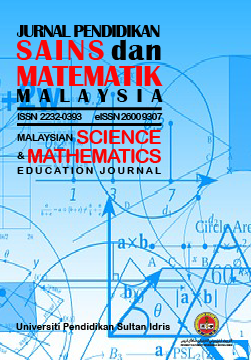Need analysis of technology-based Pedagogical Module in 2D Geometry: A case study in Malaysia
DOI:
https://doi.org/10.37134/jpsmm.vol13.2.6.2023Keywords:
2D geometry, technology, thinking level, pedagogical module, teachersAbstract
Current studies and achievements show students’ low achievement in geometry and some improvements need to be made to overcome this problem. The purpose of this study is to identify the need for the development of a technology-based pedagogical module for students' Geometric Thinking Level (GTL) from the teacher's perception. This study is a case study using a survey method. The questionnaires were distributed to 60 Mathematics teachers from a district in Selangor. The finding of the study shows that 96.7% of teachers agree on the development of technology-based pedagogical module for the topic of 2D geometry. In addition, results show that there is a significant difference in performance expectancy and effort expectancy between teachers with less than 20 years and more than 20 years of teaching experience. The average mean for these two expectancies is also high. Thus, this teaching module should be developed as a teaching aid to enhance teaching and learning in Geometry.
Downloads
References
Abd Fattah, T., Yahya, F. H., Siraj, S., Kurniawan, H., & Mat Zain, R. (2021). Need Analysis for Development of Pedagogical Model Integration of Visualization Technology to Enhance Performance in Geometry. Jurnal Pendidikan Sains Dan Matematik Malaysia, 11(2), 110-121. https://doi.org/10.37134/jpsmm.vol11.2.9.2021
Abdul Razaq Ahmad, Mohd Mahzan Awang & Jamil Ahmad. (2017). Aspirasi terhadap kepimpinan politik negara. Malaysian Journal of Youth Studies, 16,19-47.
Ab Hajis, N. A., Rosli, R., Mahmud, M. S., Halim, L., & Abdul Karim, A. (2022). Technology Integration Among Mathematics Teachers During Home-Based Teaching and Learning. Jurnal Pendidikan Sains Dan Matematik Malaysia, 12(1), 39-53. https://doi.org/10.37134/jpsmm.vol12.1.4.2022
Al-Anezi, Y. H., & Alajmi, S. M. (2021). Factors that influence english teachers’ acceptance and use of e-Learning technologies. International Education Studies, 14(9), 15–27. https://doi.org 10.5539/ies.v14n9p15
Alda, W. R., Elejorde, G. C., & Alda, R. C. (2022). Techmentoring program: A school-based ICT initiative for teachers. Journal of Research, Policy & Practice of Teachers and Teacher Education, 12(2), 82–97. https://doi.org/10.37134/jrpptte.vol12.2.6.2022
Al-zboon, H. S., Gasaymeh, A. M., & Al-Rsa'i, M. S. (2021). The attitudes of science and mathematics teachers toward the integration of information and communication technology (ICT) in their educational practice: The Application of The Unified Theory of Acceptance and Use of Technology (UTAUT). World Journal of Education, 11(1), 75–85. https://doi.org/10.5430/wje.v11n1p75
Buraimo, O. F., Yusuf, M. O., Olusanj, M. O., Ajijola, E. M. & Aladesusi, G. A. (2020). Examining performance expectancy and effort expectancy as determinants of secondary school teachers’ behavioural intention to use mobile technologies for instruction in kaduna state, nigeria. World Journal of Innovative Research (WJIR), 8(2), 42-47.
Cohen, L., Manion, L., & Morrison, K. (2018). Research methods in education (8th ed.). Routledge.
Dindar, M, Suorsa, A, Hermes, J, Karppinen, P, Näykki, P. (2021). Comparing technology acceptance of K-12 teachers with and without prior experience of learning management systems: A Covid-19 pandemic study. Journal of Computer Assisted Learning, 37:1553– 1565. https://doi.org/10.1111/jcal.12552.
District Education Office. (2021). Statistik Pendidikan. Pejabat Pendidikan Daerah Sabak Bernam. Retrieved April 10, 2023, from http://www.ppdsbernam.edu.my/v2/
Fauziah Salleh & Shaharuddin Md Salleh. (2020). Pembangunan aplikasi pembelajaran 3d maths untuk topik bentuk geometri 3 dimensi berasaskan android. Innovative Teaching and Learning Journal, 3(2), 80–91.
Gaboy, R. G., Mabalay, M. C., Mananghaya, M. E., Mercado, M. G. M., & Romblon, B. M. (2020). Coping with the new norm: ICT-pedagogy integration awareness and competencies of TEI faculty. Journal of Research, Policy & Practice of Teachers and Teacher Education, 10(2), 49-62. https://doi.org/10.37134/jrpptte.vol10.2.4.2020
MOE. (2020). Buku Laporan Kebangsaan TIMSS 2019. Diperoleh daripada https://www.moe.gov.my/en/pemberitahuan/announcement/buku-laporan-kebangsaan-timss-2019
MOE. (2023). Bilangan Guru Matematik Dan Matematik tambahan di Sekolah Menengah Kebangsaan di Malaysia - MAMPU. Retrieved April 28, 2023, from https://www.data.gov.my/data/ms_MY/dataset/bilangan-guru-matematik-dan-matematik-tambahan-di-sekolah-menengah-kebangsaan-di-malaysia
Mohd Awang Idris, Haslina Muhamad & R Zirwatul Aida R Ibrahim. (2018). Metodologi penyelidikan sains sosial. Universiti Malaya.
Mohd Ridhuan Mohd Jamil & Nurulrabihah Mat Noh. (2021). Kepelbagaian metodologi dalam penyelidikan reka bentuk dan pembangunan. Qaisar Prestige Resources.
Mohd Rizal Abdul Raman & Ying Leh Ling. (2021). Faktor kegagalan pelajar dalam pembelajaran Matematik mengikut jantina: Suatu kajian di Politeknik. International Conference on Economics, Entrepreneurship and Management.
Muhammad Ammar Naufal, Abdul Halim Abdullah, Sharifah Osman, Mohd Salleh Abu & Hisyam Ihsan. (2020). Van hiele level of geometric thinking among secondary school students. International Journal of Recent Technology and Engineering (IJRTE), 8(6), 478-481. https://doi.org/10.35940/ijrte.F7541.038620
Muhammad Nasiru Hassan, Abdul Halim Abdullah & Norulhuda Ismail. (2020). Effects of integrative interventions with van hiele phase on students’ geometric thinking: A systematic review. Journal of Critical Reviews, 7(3), 1133-1139. https://doi.org/10.31838/jcr.07.13.194
Novita, R., Putra, M., Rosayanti, E. & Fitriati, F. (2018). Design learning in mathematics education: Engaging early childhood students in geometrical activities to enhance geometry and spatial reasoning. Journal of Physics: Conf. Series, 1088. https://doi.org/10.1088/1742-6596/1088/1/012016
Ruslina Othman, Nor’ain Mohd Tajudin & Mazlini Adnan. (2021). Needs analysis for developing a thinking-based learning module in mathematics learning. Turkish Journal of Computer and Mathematics Education, 12(4), 1165-1172. https://doi.org/10.17762/turcomat.v12i4.629
Saedah Siraj, Muhammad Ridhuan Tony Lim Abdullah & Rozaini Muhamad Rozkee. (2021). Pendekatan penyelidikan reka bentuk dan pembangunan: aplikasi kepada penyelidikan pendidikan. Pendidikan Sultan Idris.
Thangamani, U. & Leong, K. E. (2019). Student’s achievement in symmetry of two dimensional shapes using Geometer’s Sketchpad. Malaysian Online Journal of Educational Sciences, 7(1), 14-22.
Yee, M. L. S., & Abdullah, M. S. (2021). A Review of UTAUT and Extended Model as a Conceptual Framework in Education Research. Jurnal Pendidikan Sains Dan Matematik Malaysia, 11, 1-20. https://doi.org/10.37134/jpsmm.vol11.sp.1.2021
Downloads
Published
Issue
Section
License
Copyright (c) 2023 Noor Atiqah Hashim, Faridah Hanim Yahya, Mohd Ridhuan Mohd Jamil, Nurul Ain Mohd Daud, Wasilatul Murtafiah

This work is licensed under a Creative Commons Attribution-NonCommercial-ShareAlike 4.0 International License.





